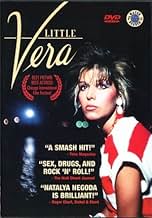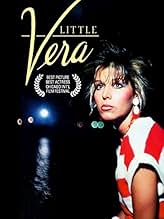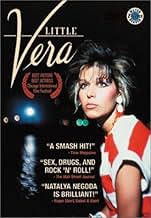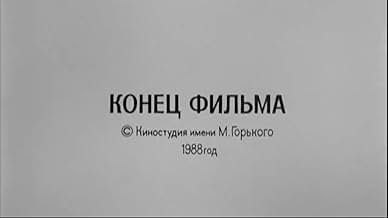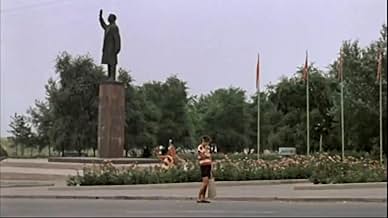IMDb RATING
6.9/10
2.3K
YOUR RATING
A teenage girl, who has just finished school feels trapped and aimless in her ordinary Russian family, supported by an alcoholic father, in a dull industrial town.A teenage girl, who has just finished school feels trapped and aimless in her ordinary Russian family, supported by an alcoholic father, in a dull industrial town.A teenage girl, who has just finished school feels trapped and aimless in her ordinary Russian family, supported by an alcoholic father, in a dull industrial town.
- Director
- Writers
- Stars
- Awards
- 7 wins & 9 nominations total
Aleksandr Negreba
- Viktor - brat Very
- (as Alexander Alexseyev Negreba)
Aleksandra Tabakova
- Lenka Chistyakova
- (as Alexandra Tabakova)
Gennady Goryachev
- Sledovatel
- (as G. Goryachev)
Vadim Zakharchenko
- Muzhchina v bolnichnoy palate
- (as V. Zakharchenko)
Mariya Khmelik
- podruga Viktora
- (as M. Khmelik)
Maksim Nayrabe
- brat Lenki Chistyakovoy
- (as Maxim Nairabe)
- Director
- Writers
- All cast & crew
- Production, box office & more at IMDbPro
Featured reviews
This once notorious drama (at least in its own country) was hailed as a breakthrough when first released simply for daring to show modern Soviet life without the usual State-approved propaganda halo, in all its actual anti-bureaucratic grubbiness. But watching the film on this side of the erstwhile Iron Curtain only reinforces the notion that Soviet youth culture is thirty years behind the rest of the world: despite the often oppressive details it might be just another quaint teen delinquency relic from early 1960s Hollywood, dubbed into Russian and updated with casual sex and drug abuse. In other words, it's hardly a revelation to discover that Russian kids are just as misunderstood by adults as their American role models. But while the attitudes may look dated to Western audiences, it's at least an honest attempt to portray something of the boredom and defiant posturing of youth, in a country not exactly noted for addressing its generation gap.
Vera is a rebellious daughter of dissatisfied proletariat parents. Her father Kolya is an alcoholic. They keep referring to her older brother Victor who is a success in Moscow. They don't like her lifestyle or her friends. She falls for Sergei and decides to marry. It raises the tension in the family. Sergei and and Kolya don't get along. Sergei starts living with the family but it doesn't go well in one violent drunken confrontation.
The film looks pretty grainy and weak compared to most indies of that time. It was sold as the first sex scene in Soviet cinema but there is nothing erotic about this movie. It is gritty, and dirty. The overbearing poverty is the backdrop. That is the more compelling aspect. The story of a rebellious daughter and family dysfunction is not necessarily original. It is somewhat new to see it portrayed about Russia at that time. The movie is filled with a downtrodden sadness and that goes for the lead actress Natalya Negoda. It's fine as a grungy indie and notable for being a Soviet film.
The film looks pretty grainy and weak compared to most indies of that time. It was sold as the first sex scene in Soviet cinema but there is nothing erotic about this movie. It is gritty, and dirty. The overbearing poverty is the backdrop. That is the more compelling aspect. The story of a rebellious daughter and family dysfunction is not necessarily original. It is somewhat new to see it portrayed about Russia at that time. The movie is filled with a downtrodden sadness and that goes for the lead actress Natalya Negoda. It's fine as a grungy indie and notable for being a Soviet film.
What I found so interesting about this film was the incredible contrast of subject matter and mood between this film and the Russian films that came before it.
A product of Glasnost, in an attempt to modernize the cinema and remove censorship, allowed for Russians to be shown realistically and their individual stories be told instead of a happy Russian body of agreeable people.
The film addresses the reality of dysfunctional families, crammed into small apartments, alcoholism, poverty, and young adults confused and rebelling against authority.
Little Vera depicts Vera and her family with attitudes of hopelessness, apathy and loneliness.
I liked the movie for the fact that it is ground breaking showing problematic issues and stories of individuals that were never or could never be shown on screen previously under oppressive governments.
I personally wouldn't watch it again. Its worth watching once! Once was enough for me because I hated all the characters and was left depressed after watching a movie where people are constantly fighting but that- I think is the point of the film.
A product of Glasnost, in an attempt to modernize the cinema and remove censorship, allowed for Russians to be shown realistically and their individual stories be told instead of a happy Russian body of agreeable people.
The film addresses the reality of dysfunctional families, crammed into small apartments, alcoholism, poverty, and young adults confused and rebelling against authority.
Little Vera depicts Vera and her family with attitudes of hopelessness, apathy and loneliness.
I liked the movie for the fact that it is ground breaking showing problematic issues and stories of individuals that were never or could never be shown on screen previously under oppressive governments.
I personally wouldn't watch it again. Its worth watching once! Once was enough for me because I hated all the characters and was left depressed after watching a movie where people are constantly fighting but that- I think is the point of the film.
Please Note: This review mentions key moments in this film. Do not read if you have not seen the movie!
Vera, the protagonist in the film Little Vera, lives in a closed, cramped world. She is trying to escape, both emotionally and physically, but in the end is no closer to freedom. Most of the reviews I read brought up the recurrent theme of limited space in this movie. The family apartment represents Vera's closed world in the simplest sense. She has no room to move, no room to grow and no room to find herself. Everywhere she turns the finds herself face to face with her mother, father, brother or simply a wall.
However, the family apartment is only one way that the director maintains this constant feeling of confinement. Throughout the film, Vera is rarely shown at a distance. She is always in a small room, or sitting directly next to someone else, or being physically smothered by those around her (Andrei, Sergei, etc.). She is almost always in physical contact with another person. During the rare times that she truly is alone, such as when she is attempting suicide, the camera only zooms in closer. In this way, the lens replaces the walls and smothering humanity, itself becoming an object of confinement.
If visual effects of confinement aren't possible, then sound is used to heighten the sense of disparity. Most of the dialogue in Little Vera, with the exception of less intense moments when the music volume is increased, is shouted, yelled or screamed. Vera's family is constantly in conflict and even the most civil dinner eventually erupts into argument. I found the constant barrage of sound equally as suffocating as the repeated scenes within the tiny apartment, and twice as hard on the nerves. Unlike Vera, however, we could leave when it was all over.
It is hard not to feel sorry for Vera at the end of the movie, but is our sympathy justified? She returns, time and again, to the very apartment and situation that is slowly taking the life out of her. Can she really be considered a victim if she is bringing a lot of her misery upon herself?
Vera, the protagonist in the film Little Vera, lives in a closed, cramped world. She is trying to escape, both emotionally and physically, but in the end is no closer to freedom. Most of the reviews I read brought up the recurrent theme of limited space in this movie. The family apartment represents Vera's closed world in the simplest sense. She has no room to move, no room to grow and no room to find herself. Everywhere she turns the finds herself face to face with her mother, father, brother or simply a wall.
However, the family apartment is only one way that the director maintains this constant feeling of confinement. Throughout the film, Vera is rarely shown at a distance. She is always in a small room, or sitting directly next to someone else, or being physically smothered by those around her (Andrei, Sergei, etc.). She is almost always in physical contact with another person. During the rare times that she truly is alone, such as when she is attempting suicide, the camera only zooms in closer. In this way, the lens replaces the walls and smothering humanity, itself becoming an object of confinement.
If visual effects of confinement aren't possible, then sound is used to heighten the sense of disparity. Most of the dialogue in Little Vera, with the exception of less intense moments when the music volume is increased, is shouted, yelled or screamed. Vera's family is constantly in conflict and even the most civil dinner eventually erupts into argument. I found the constant barrage of sound equally as suffocating as the repeated scenes within the tiny apartment, and twice as hard on the nerves. Unlike Vera, however, we could leave when it was all over.
It is hard not to feel sorry for Vera at the end of the movie, but is our sympathy justified? She returns, time and again, to the very apartment and situation that is slowly taking the life out of her. Can she really be considered a victim if she is bringing a lot of her misery upon herself?
One of the major aspects of "Malenkaya Vera" (called "Little Vera" in English) is that it was the first movie from the Soviet Union that featured a sex scene, albeit a short one. The title is important: Vera is the Russian word for "faith", identifying that punk Vera (Natalya Negoda) has little faith in the Soviet system. And as the movie shows, there's not much faith to be had in it. The opening scene shows the bleak industrial town of Zhdanov, nearly a hell on earth. When Vera's lover Sergei (Andrey Sokolov) moves in with her family, it leads to some unexpected events.
Like in many Russian movies, people's names describe their characters. For example, there's Viktor (remember that "victor" means winner). All in all, this is a good look at the Soviet Union while it was collapsing - and we can see why it was collapsing. Really good.
Like in many Russian movies, people's names describe their characters. For example, there's Viktor (remember that "victor" means winner). All in all, this is a good look at the Soviet Union while it was collapsing - and we can see why it was collapsing. Really good.
Did you know
- TriviaThis was the first Soviet film to depict graphic sexual intercourse on screen.
- SoundtracksHeaven And Hell
(uncredited)
Written by Dieter Bohlen
Performed by C.C. Catch
Produced by Dieter Bohlen
[plays during playback of the video clip of the same name C. C. Catch]
- How long is Little Vera?Powered by Alexa
Details
Box office
- Gross US & Canada
- $1,262,598
- Opening weekend US & Canada
- $23,950
- Apr 16, 1989
- Gross worldwide
- $1,262,598
Contribute to this page
Suggest an edit or add missing content

